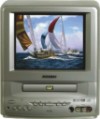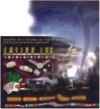|
Sci-tech
See
Your Soap Anywhere
 Electronics
giant Sony has come up with an innovation that could be
very useful for travellers who just cant miss their favourite
serials while they are away from home, by designing a portable,
wireless TV that can play a viewer's favourite stations
anywhere in the world. According to the New York Post, the
LocationFree TV, can access a cable box, home computer,
TiVo or DVD player via the Internet and receive pre-recorded
or regular programming anywhere as long as there is a high-speed
Internet connection. When the system is used at home, it
can hook up to its bay station via a wireless connection
using the same radio frequencies that millions of wireless
home computer users have. On the road, it has an ethernet
port that a viewer can use to plug into a high-speed connection
and use the Internet to access the bay station and whatever
it's connected to back home. The TV can also be used to
surf the Web, check e-mail and using a screen-capture function,
take pictures of scenes as they unfold on TV. Electronics
giant Sony has come up with an innovation that could be
very useful for travellers who just cant miss their favourite
serials while they are away from home, by designing a portable,
wireless TV that can play a viewer's favourite stations
anywhere in the world. According to the New York Post, the
LocationFree TV, can access a cable box, home computer,
TiVo or DVD player via the Internet and receive pre-recorded
or regular programming anywhere as long as there is a high-speed
Internet connection. When the system is used at home, it
can hook up to its bay station via a wireless connection
using the same radio frequencies that millions of wireless
home computer users have. On the road, it has an ethernet
port that a viewer can use to plug into a high-speed connection
and use the Internet to access the bay station and whatever
it's connected to back home. The TV can also be used to
surf the Web, check e-mail and using a screen-capture function,
take pictures of scenes as they unfold on TV.
Crack
Your Crosswords
 Tired
of stressing your grey cells to get that crossword puzzle
right? Well, it's time for you to turn a little tech savvy
and get Web Crow, a new software programme that helps in
solving crosswords. According to Nature, the program, developed
by computer engineers Marco Gori and Marco Ernandes at the
University of Siena, is capable of reading crosswords in
any language, understand the clues, search the web for the
correct answers and then fit them into the puzzle. The program
is an improvement over the first crossword-solving computer
program called Proverb. Web Crow can give most crossword
experts a run for their money due to its multi-lingual abilities,
believe its creators. "It may not be able to solve
the most difficult clues all the time but it can solve most
in most languages. What experts can do that, even in two
languages?" Gori said. Gori and Ernandes are also hopeful
that the algorithms developed for Web Crow can also be applied
in other areas requiring artificial intelligence like, for
extracting useful info from net automatically or to generate
the most befitting combinations from a large data, such
as course schedules or staff shifts. Tired
of stressing your grey cells to get that crossword puzzle
right? Well, it's time for you to turn a little tech savvy
and get Web Crow, a new software programme that helps in
solving crosswords. According to Nature, the program, developed
by computer engineers Marco Gori and Marco Ernandes at the
University of Siena, is capable of reading crosswords in
any language, understand the clues, search the web for the
correct answers and then fit them into the puzzle. The program
is an improvement over the first crossword-solving computer
program called Proverb. Web Crow can give most crossword
experts a run for their money due to its multi-lingual abilities,
believe its creators. "It may not be able to solve
the most difficult clues all the time but it can solve most
in most languages. What experts can do that, even in two
languages?" Gori said. Gori and Ernandes are also hopeful
that the algorithms developed for Web Crow can also be applied
in other areas requiring artificial intelligence like, for
extracting useful info from net automatically or to generate
the most befitting combinations from a large data, such
as course schedules or staff shifts.
Hurricane
Blows Away Junk Mails
 Thanks
to the number of hurricanes that have hit Florida, a large
chunk of the world's junk emails have been blown away. According
to The Mirror, Florida which is touted as the spam capital
of the world, has had a drop in the percentage of junk messages,
including porn and gambling pop-ups, after hurricanes named
Charlie, Ivan and Frances smashed the headquarters of some
of giant email firms. "There has been a blip. There
are probably only 200 spammers in the world and most of
them are in Florida," Paul Wood, of anti-spam firm
Messagelabs, was quoted by the paper as saying. "There
are 35 billion emails a day and 85 per cent are spam. After
the hurricanes, that fell to around 75 per cent," Steve
Linford, of junk email watch group Spamhaus, added. Thanks
to the number of hurricanes that have hit Florida, a large
chunk of the world's junk emails have been blown away. According
to The Mirror, Florida which is touted as the spam capital
of the world, has had a drop in the percentage of junk messages,
including porn and gambling pop-ups, after hurricanes named
Charlie, Ivan and Frances smashed the headquarters of some
of giant email firms. "There has been a blip. There
are probably only 200 spammers in the world and most of
them are in Florida," Paul Wood, of anti-spam firm
Messagelabs, was quoted by the paper as saying. "There
are 35 billion emails a day and 85 per cent are spam. After
the hurricanes, that fell to around 75 per cent," Steve
Linford, of junk email watch group Spamhaus, added.
The
Future Of Our Face
 Evolution
might have brought about a lot of changes in the human face,
but technology seems to be aiming at perfecting it Digitally.
According to BBC, a new exhibition at London's Science Museum
titled Future Face questions the widespread use of digital
enhancement to "improve" faces in photos and the
implications of this technology for society. It explores
how the face has been depicted and altered throughout history
and opens with the declaration: "The face is our interface
with the world. Through it we navigate personal, social
and cultural spaces." According to The Future Face
curator Professor Sandra Kemp, "I don't mean the exhibition
to be a warning because it's interrogative, raising questions
but I hope it will make people pause for reflection. The
sensation of face transplants has diverted us but something
that interests me is what is happening digitally. "Lots
of people don't have sticky photo albums anymore. Their
pictures are held digitally and they can be altered on Photoshop.
People are enhancing their faces all the time. This face
is smooth and narrow, with a small jaw, big lips and manga
Japanese eyes for the females," she said. Kemp fears
that digitally enhanced images in the media and on our PCs
will lead us to lose the features, which make the face unique.
"The more we smooth out our face, the more we are depriving
it of its abilities," she added. Evolution
might have brought about a lot of changes in the human face,
but technology seems to be aiming at perfecting it Digitally.
According to BBC, a new exhibition at London's Science Museum
titled Future Face questions the widespread use of digital
enhancement to "improve" faces in photos and the
implications of this technology for society. It explores
how the face has been depicted and altered throughout history
and opens with the declaration: "The face is our interface
with the world. Through it we navigate personal, social
and cultural spaces." According to The Future Face
curator Professor Sandra Kemp, "I don't mean the exhibition
to be a warning because it's interrogative, raising questions
but I hope it will make people pause for reflection. The
sensation of face transplants has diverted us but something
that interests me is what is happening digitally. "Lots
of people don't have sticky photo albums anymore. Their
pictures are held digitally and they can be altered on Photoshop.
People are enhancing their faces all the time. This face
is smooth and narrow, with a small jaw, big lips and manga
Japanese eyes for the females," she said. Kemp fears
that digitally enhanced images in the media and on our PCs
will lead us to lose the features, which make the face unique.
"The more we smooth out our face, the more we are depriving
it of its abilities," she added.
Hijacking
A Computer
 Flawed
software code used by numerous Microsoft applications to
render images could mean that a specially constructed image
file could hijack a computer or spread a virus. Ten years
ago the idea of an image infecting a computer was the subject
of a hoax email. But what was once a myth is now a genuine
threat after Microsoft disclosed a flaw in the image processing
code used in a range of its software programs. Some experts
blame the new threat on shoddy programming. "In a properly
coded world, a graphic should not be able to infect your
computer," Graham Cluley, senior researcher with the
UK-based anti-virus firm Sophos was quoted by newscientist
as saying. So far, no one is known to have exploited the
flaw and Cluley says it is far from certain anyone will
develop a computer virus based on it. A crafty programmer
can use such a flaw to execute unauthorised code on a computer,
potentially providing a point of entry in order to take
complete control. Flawed
software code used by numerous Microsoft applications to
render images could mean that a specially constructed image
file could hijack a computer or spread a virus. Ten years
ago the idea of an image infecting a computer was the subject
of a hoax email. But what was once a myth is now a genuine
threat after Microsoft disclosed a flaw in the image processing
code used in a range of its software programs. Some experts
blame the new threat on shoddy programming. "In a properly
coded world, a graphic should not be able to infect your
computer," Graham Cluley, senior researcher with the
UK-based anti-virus firm Sophos was quoted by newscientist
as saying. So far, no one is known to have exploited the
flaw and Cluley says it is far from certain anyone will
develop a computer virus based on it. A crafty programmer
can use such a flaw to execute unauthorised code on a computer,
potentially providing a point of entry in order to take
complete control.
Source:
The New Scientist.com / Webindia123.com / Google
Copyright
(R) thedailystar.net 2004
|
